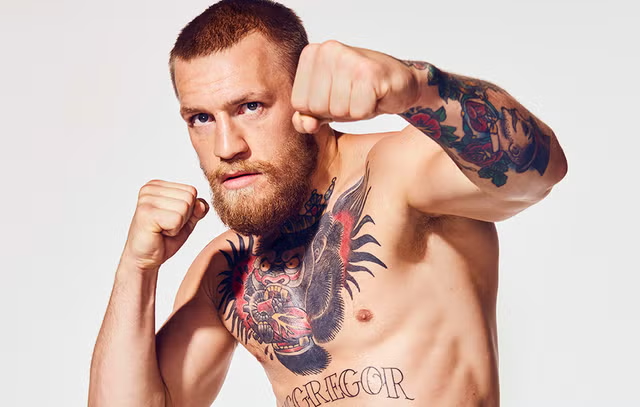Love him or not, Conor McGregor has something we can all learn from: a mindset. Long before he became a global name, he was a young man from Dublin with big dreams and little money. What changed his life was how he thought, how he prepared, and how he refused to give up when things went wrong.
From working as a plumber’s apprentice in Dublin to becoming one of the biggest names in combat sports, his story is proof that mindset matters as much as talent. McGregor’s journey is a reminder that success isn’t just about talent or strength; it is about how you handle pressure, failure, and self-doubt.
His mental habits, from the way he talks to himself to the way he visualizes his goals, show what it means to truly back yourself. Even when things don’t go his way, he somehow finds a way to reset, refocus, and come back stronger.
In this post, we will explore the top psychological lessons behind Conor McGregor’s rise, simple but powerful ideas that can help anyone build more confidence, focus, and resilience in everyday life.

Source: Google
Lesson 1: Identity & Self-Belief
Before Conor McGregor ever held a championship belt, he carried a champion’s mindset. He didn’t wait for success to believe he was great. He believed first, and success followed. McGregor often says, Before Conor McGregor ever held a championship belt, he carried a champion’s mindset. He didn’t wait for success to believe he was great: he believed first, and success followed. McGregor often says, “I’m not talented, I’m obsessed.” That obsession came from a deep sense of identity. He saw himself as the fighter who would rise to the top.
This kind of self-belief isn’t arrogance. When you decide who you are and back it up with consistent effort, confidence becomes a habit. McGregor’s belief in himself didn’t come from wins alone. It showed up in how he trained when no one was watching, how he spoke about his goals, and how he refused to let setbacks define him.
You don’t need a championship belt to use the same mindset. Start by owning your identity, even if you’re still a beginner. Say, “I’m someone who’s improving every day,” or “I’m serious about my goals.” Over time, that self-belief builds momentum. Like McGregor, you start acting in line with the person you believe you are, and that changes everything.
Lesson 2: Embrace Discomfort and Risk
Conor McGregor built his career by doing what most people avoid: stepping straight into the unknown. He’s fought in multiple weight classes, taken on tougher opponents, and even switched to boxing against one of the greatest of all time, Floyd Mayweather. Win or lose, McGregor never played it safe.
That willingness to face discomfort is what keeps him growing. When you put yourself in uncomfortable situations, whether it is waking up early to train, starting a new project, or learning a new skill, you force your mind to adapt. McGregor understands that growth doesn’t happen when things are easy. It happens when you challenge yourself and risk failure.
For everyday life, this lesson is simple: if something scares you a little, it is probably worth doing. Discomfort is where confidence is built. You don’t have to take huge leaps. Start small: speak up in a meeting, take on a new responsibility, or push through one more workout rep. The more often you face discomfort, the less it controls you. Like McGregor, you start realizing that fear is just a signal that you are moving in the right direction.
Lesson 3: Visualization and Mental Rehearsal
Before every fight, Conor McGregor trains his mind to see success. He is known for vividly imagining his wins long before they happen. From his walk to the Octagon to the exact moment his hand gets raised, McGregor pictures every detail until it feels real.
This is a kind of mental preparation. When you have already “seen” yourself succeed hundreds of times in your mind, you enter the real moment with confidence. That’s why McGregor often says, “If you can see it here and you have the courage to speak it, it will happen.”
You don’t need to be an athlete to use this skill. Visualization can help you prepare for anything: a presentation, an exam, a performance, or even a tough conversation. Take a few minutes to close your eyes and imagine it going well: how you will feel, how you will respond, what success will look like. The goal is to train your brain to stay focused and ready when it counts.
Lesson 4: Managing Pressure, Nerves & Fear
Even someone as confident as Conor McGregor feels pressure. The difference is in how he handles it. Under the lights, with millions watching, he doesn’t let nerves control him; he uses them. Instead of seeing fear as a weakness, McGregor treats it as energy that sharpens his focus.
He is open about the fact that every fighter feels anxious before a big moment. The trick, he says, is to stay composed and trust the work you have already done. His calm walkouts and steady stare are part of his mental control. By acting confident, he becomes confident. It is a form of self-conditioning that helps him perform at his best when it matters most.
You can do the same in your own life. Pressure is part of anything meaningful: from job interviews to public speaking to making big decisions. Instead of trying to get rid of nerves, use them as fuel. Take a deep breath, remind yourself that preparation beats panic, and move forward anyway. Once you understand that, pressure stops being your enemy and starts becoming your training partner.
Lesson 5: Consistency, Habits & Discipline
Conor McGregor’s confidence comes from years of showing up, even when he didn’t feel like it. Behind the highlight reels and headlines is a man who trains relentlessly, sticks to routines, and treats discipline like a non-negotiable part of success.
He has often spoken about how success is built in the quiet moments: the early mornings, the recovery days, the extra rounds when everyone else has stopped. That is where consistency turns ambition into progress. For McGregor, discipline is about never losing momentum.
The same rule applies outside the gym. Whether you’re studying, building a business, or working toward a personal goal, consistency beats motivation every time. You won’t always feel inspired, but if you can build small habits and stick to them, reading a few pages, exercising for ten minutes, or practicing your craft daily, you will make real progress.
McGregor’s story reminds us that success is a collection of small choices repeated over time. When you keep showing up, even on the hard days, you slowly become the kind of person who doesn’t quit, and that’s where real confidence begins.
Lesson 6: Recovery, Failure & Growth Mindset
Conor McGregor’s career has not been a straight line to success. He has faced tough losses, public criticism, and moments when people counted him out. Yet each time, he has found a way to come back stronger. That ability to recover and learn from failure is one of the most powerful parts of his mindset.
Instead of hiding from defeat, McGregor studies it. He looks at what went wrong, fixes it, and returns with new energy. After losing to Nate Diaz in 2016, he adjusted his training, refined his strategy, and won the rematch. That is a growth mindset in action: viewing failure not as proof that you can’t, but as feedback showing how you can improve.
For most of us, setbacks feel personal, like proof that we are not good enough, not talented enough, and not skilled enough to do a small task. But McGregor’s example shows that losing is merely a reset button. The key is to pause, reflect, and get back to work without letting your confidence disappear.
If you can adopt that same mindset of treating mistakes as lessons, progress becomes inevitable. You stop fearing failure and start using it. Like McGregor, you learn that real strength is in how you respond when you don’t.
Applying McGregor’s Psychology to Your Life
- Start with belief. Speak to yourself with confidence, even when you are still learning. How you talk to yourself shapes how you act.
- Get comfortable being uncomfortable. Try things that challenge you. Start a new project, a harder workout, a bold conversation. Growth hides behind discomfort.
- Visualize your success. Spend a few minutes each day imagining what achieving your goals will look and feel like. It trains your brain to stay focused.
- Use nerves as fuel. When you feel anxious or pressured, remind yourself that it’s a sign you care. Channel that energy into preparation and action.
- Build routines you can stick to. Discipline is about doing something small every day that moves you forward.
- Learn from setbacks. When something goes wrong, look for the lesson instead of the blame. Every failure can make your next attempt stronger.
- Stay grounded. Confidence and humility can coexist. Celebrate wins, but always stay open to learning and improving.
Takeaway
Conor McGregor’s story reminds us that mindset shapes everything. His confidence, focus, and ability to bounce back weren’t built overnight. They came from daily choices, steady habits, and a belief that he was capable of more. He is proof that success starts in the mind long before it shows up in reality.
You don’t need to be in a boxing ring to apply his lessons. We all face moments that test our patience, courage, and belief. Whether it is chasing a dream, dealing with setbacks, or trying to stay motivated when progress feels slow, life finds a way to push us into a brick wall. What McGregor teaches us is simple: keep showing up, stay true to your goals, and treat every challenge as a chance to grow stronger.
If you take one thing from his journey, let it be this: the fight is never just outside; it is almost always within you. When you train your thoughts with the same care you train your body or your skills, confidence becomes second nature. You stop waiting for motivation and start creating it.
Before you go, take our quick mindset quiz to see how your mental habits compare to Conor McGregor’s. It is a fun way to reflect on how you handle pressure, build confidence, and stay consistent, and you might discover the next small change that could make a big difference in your own journey.






